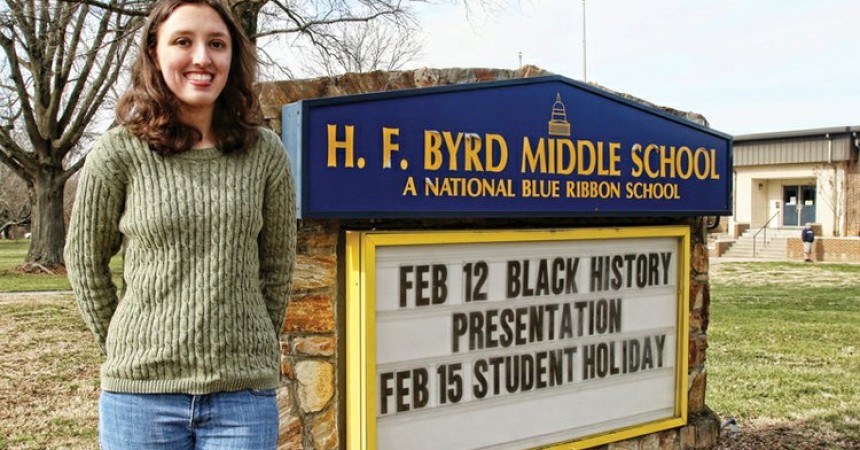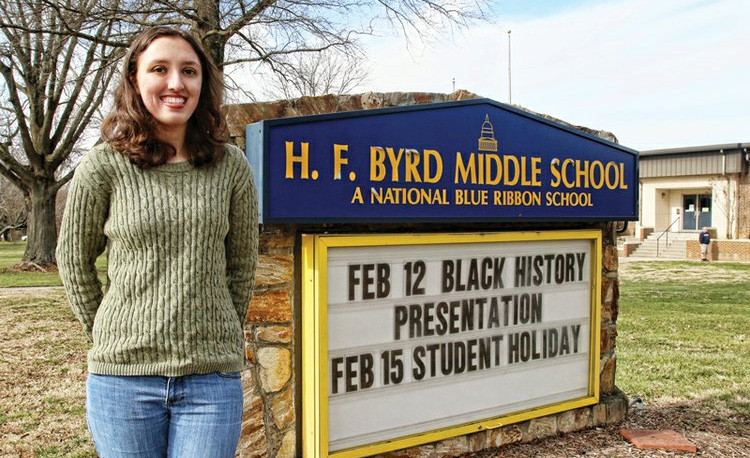
Stained by dishonor: Student launches growing effort to remove segregationist’s name from school

Hermitage High School senior Jordan Chapman is receiving growing support for her campaign to change the name of Harry F. Byrd Sr. Middle School in Henrico County.
By Joey Matthews
Special to the Outlook from Trice Edney News Wire
Jordan Chapman said her jaw dropped in incredulous disbelief the day she learned in her Hermitage High School history class about the late Harry F. Byrd Sr., the former Virginia governor, U.S. senator and avowed White separatist for whom H.F. Byrd Middle School in Henrico County is named.
“I learned that a school right down the street from where I live was named after a man who tried to keep schools segregated by shutting them down across the state,” Jordan, a 17-year-old senior, said during an interview at her Western Henrico County home.
There, she and four adults gathered to discuss with the Richmond Free Press their campaign — started by Jordan last fall — to have Henrico Public Schools rename the middle school at 9400 Quioccasin Road to rid it of the racist legacy of Mr. Byrd.
As a U.S. senator, Byrd was one of the chief architects of “Massive Resistance,” the fiercely backed, state-sanctioned policy to ignore the 1954 landmark U.S. Supreme Court ruling in Brown v. Board of Education ordering the desegregation of public schools because of inequities. Byrd met with members of the General Assembly to design the strategy to enact laws and policies that led to the closure of many public schools in Virginia between 1958 and 1964 rather than integrate.
Thousands of African-American children were denied a public education during that time, while state money was funneled to all-White private schools to support the education of many White students in places where the schools were closed.
During the next few years, state and federal courts eventually overturned most of the laws that fueled Massive Resistance, but aspects of the campaign against integrated schools in Virginia continued for decades.
“Why would you name a school for somebody who tried to stop some people from being educated?” Jordan recalled thinking.
The more she learned about Byrd’s efforts to deny public education opportunities to black children, the more she recoiled at the middle school’s name.
“It’s a moral issue to me,” she said. “It’s hard for me to believe that a school would honor someone like him. I think it’s time to change the name.”
As an alternative, she offered the name Oliver Hill Middle School to honor the late trailblazing Richmond civil rights attorney who won numerous legal battles at the height of the Civil Rights Movement. He also was among the lawyers representing plaintiffs in the Davis v. County School Board of Prince Edward County, the Virginia case that was heard with the Brown v. Board of Education case.
“It’s amazing to me,” Jordan added, “that a school would not want to be welcoming to all of its students” by having that name.
According to Henrico Public Schools spokesperson Andrew Jenks, 20.3 percent, or 203 of Byrd Middle School’s 999 students, are African-American.
Jordan, who lives about a 5-minute drive from Byrd, explained that she was zoned to attend Byrd, but instead attended the International Baccalaureate program at Moody Middle School.
The honor roll student now attends the Hermitage High School Center for Humanities and is undecided about where she will attend college.
In August, she emailed the five members of the Henrico School Board to inquire about renaming Byrd Middle School, “but I got no responses.”
She then asked Hermitage High School Principal Andy Armstrong what he thought of her idea and he said “it was cool for me to take the initiative and here are the next steps you can take.”
Jordan said her AP government teacher Jeannine Chewning also has encouraged her. Her parents also are supportive. The response from her classmates at Hermitage is “mostly positive,” she said.
Her campaign is gaining national attention, with articles about her campaign appearing in The Washington Post and The Huffington Post, among others.
The thoughtful teen also said she has received numerous posts on social media from people across the country praising her efforts.
Jordan has spoken at three School Board meetings urging members to change the middle school’s name. She was joined by a growing number of supporters at the board’s Jan. 28 meeting.
Henrico School Board members said they would learn and discuss the estimated cost for a name change at a Feb. 11 board work session. Henrico School Board chair Michelle F. “Micky” Ogburn of the Three Chopt District told the Free Press that the cost estimate would be discussed near the end of the meeting in order to allow parents and students to attend after school ends. Afterward, neither she nor Henrico Schools Superintendent Patrick Kinlaw, who declined to discuss the issue with the Free Press, would disclose the estimate to a reporter.
However, Robert Voorhis, who lives in the Byrd Middle School district and is active in the name-change campaign, said a source estimated the cost at more than $120,000.
By comparison, Tommy Kranz, an assistant superintendent of Richmond Public Schools, told the Free Press on Tuesday it cost the city school district “less than $10,000” to rename Thompson Middle School last summer to Elkhardt-Thompson Middle School. That amount included changing the school signs, letterhead and the basketball court logo, he said.
Voorhis said he backs the name change because the school should not honor someone “who was not only a lead segregationist, but also kicked thousands of Black children out of schools.”
The Free Press reached out to Fairfield District representative Rev. Roscoe D. Cooper III, the lone African-American on the Henrico School Board and its newest member, to ask for his opinion.
“I will reserve speaking specifically about my opinion until after I have shared my position with my colleagues on the board,” he stated in an email response. “Once I share with them my position, I will gladly share it with you and explain why I feel the way I do.”
Ogburn provided no timetable for when the name-change decision would be made.







